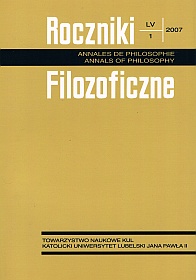Neutralist and Synthetic Theory of Evolution
Abstract
In the article the author undertakes a scrutiny of two different kinds of explication of evolutionary processes. One of them is explication with the use of natural selection and favorable mutations as the main factors of evolutionary changes. Another attempt at explication of those changes is the one presented by the author of neutralist theory, Motoo Kimura. It accepts accidental genetic drift and accumulation of neutral mutations as the basic mechanisms of evolution. Numerous researchers say that this is non-Darwinian theory of evolution. However, it should be noted that natural selection and the possibility of occurrence of positive mutations are not altogether eliminated from the presented picture of evolution. In the case of changes in environmental conditions the accumulated neutral changes may prove to be adaptive ones and then they will be selected by natural selection. The neutralist theory does not seem to be involved in the difficulties that the synthetic theory of evolution encounters. Such problems are meant here as the costs of the action of the natural selection, the speed of the evolution that seems to be too low for such evolutionary changes that we can see now to occur (assuming given costs of natural selection) and corpuscular polymorphism that occurs rather commonly. Also criticism of neutralist explication is presented as well as a possibility of harmonizing these two kinds of explication.
References
Dietrich M. R. 1994: The origins of the neutral theory of molecular evolution, „Journal of the History of Biology” 27 (1), S. 21-59.
Dyk W. 1998: Rola praw biologicznych w wyjaśnianiu ewolucyjnym, Szczecin: Wydawnictwo Naukowe Uniwersytetu Szczecińskiego.
Ford E. B. 1967: Genetyka ekologiczna, tł. K. Zaćwilichowska, Warszawa: Państwowe Wydawnictwo Rolnicze i Leśne.
Haldane J. B. S. 1957: The cost of natural selection, „Journal of Genetics” 55, s. 511-524.
Herda J. 2004: Teoria ewolucji molekularnej w ujęciu Motoo Kimury, „Zagadnienia Filozoficzne w Nauce” 35, s. 45-65.
Kimura M. 1977: The neutral theory of molecular evolution and polymorphism, „Scientia” (Milan) 112 (9-12), s. 687-707.
Kimura M. 1983: The Neutral Theory of Molecular Evolution, London, UK: Cambridge University Press.
Kimura M., Ohta T. 1971: Protein polymorphism as a phase of molecular evolution, „Nature” 229 (5285), s. 467-469.
King J. L., Jukes T. H. 1969: Non-Darwinian evolution, „Science” 164, s. 788-797.
Kloskowski K. 1990: Zagadnienie determinizmu ewolucyjnego. Studium biofilozoficzne, Gdańsk.
Kloskowski K. 1992: Syntetyczna teoria ewolucji a neutralizm i punktualizm, „Studia Philosophiae Christianae” 28 (1), s. 31-51.
Kunicki-Goldfinger W. J. H. 1979: Hipoteza neutralnych mutacji i ewolucja molekularna, „Kosmos A” 28 (1), s. 33-48.
Li W. H. 1996: Kimura’s contributions to molecular evolution, „Theoretical Population Biology” 49 (2), s. 146-153.
Łastowski K. 1987: Rozwój teorii ewolucji, Poznań: Wydawnictwo Naukowe Uniwersytetu im. Adama Mickiewicza.
Mayr E. 1964: The evolution of living systems, „Proceedings of the National Academy of Science of the United States of America” 51, s. 934-941.
Mayr E. 1999: Understanding evolution, „Trends in Ecology and Evolution” 14 (9), s. 372-373.
Mayr E. 2004: 80 years of watching the evolutionary scenery, „Science” 305 (5680), s. 46-47.
Nachman M. W. 1996: The legacy of Motoo Kimura, „Bioscience” 46 (3), s. 221-222.
Nei M. 1995: Motoo Kimura (1924-1994), „Molecular Biology and Evolution” 12 (5), s. 719-722.
Nowiński C. 1974: Pojęcie doboru naturalnego, [w:] C. Nowiński (red.), Ewolucja biologiczna. Szkice teoretyczne i metodologiczne, Wrocław–Warszawa–Kraków– Gdańsk: Wydawnictwo Polskiej Akademii Nauk, s. 39-124.
Ohta T. 1974: Mutational pressure as the main cause of molecular evolution and polymorphism, „Nature” 252, s. 351-354.
Ohta T. 1992: The nearly neutral theory of molecular evolution, „Annual Review of Ecology and Systematics” 23, s. 263-286.
Schaffner K. F. 1969: Chemical systems and chemical evolution: the philosophy of molecular biology, „American Scientist” 57 (4), s. 410-420.
Stebbins L., Ayala F. J. 1985: The evolution of Darwinism, „Scientific American” 253 (1), s. 72 -82.
Stoltzfus A. 1999: On the possibility of constructive neutral evolution, „Journal of Molecular Evolution” 49, s. 169-181.
Szweykowski J. 1987: Ewolucyjna teoria obojętnych mutacji (neutralistyczna) profesora Motoo Kimury, „Kosmos A” 36 (3), s. 375-394.
Urbanek A. 1973: Rewolucja naukowa w biologii, Warszawa: Wiedza Powszechna.
Copyright (c) 2007 Roczniki Filozoficzne

This work is licensed under a Creative Commons Attribution-NonCommercial-NoDerivatives 4.0 International License.





